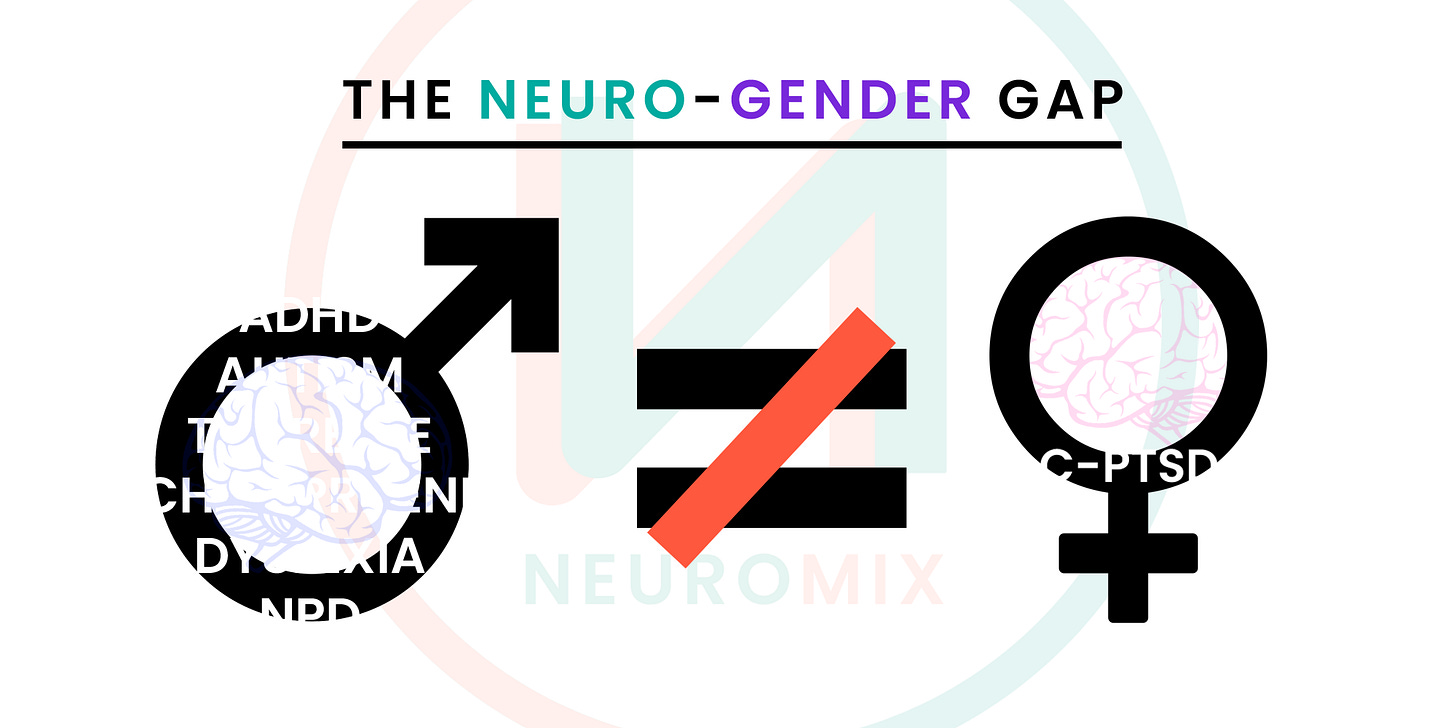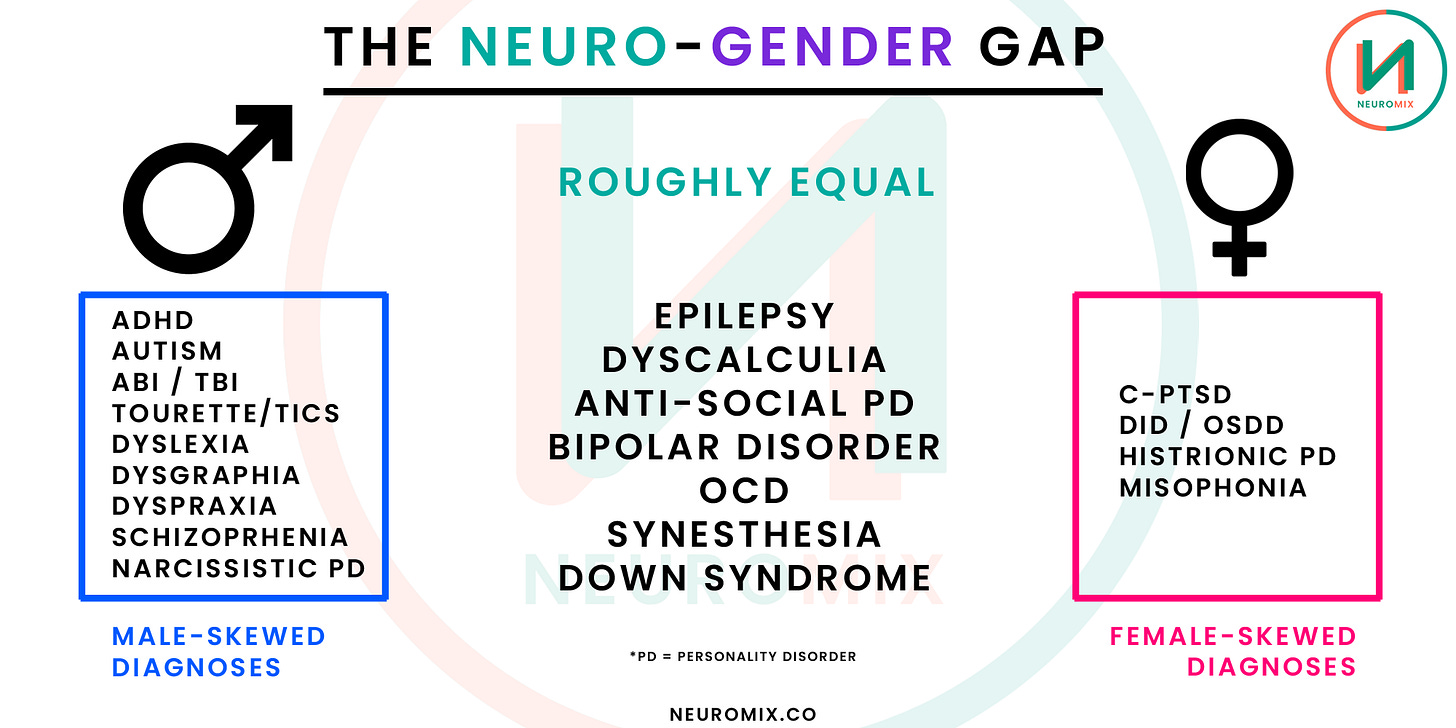Mapping the Neuro Gap - The Hidden Cost of Being Her
The Gender Pay Gap Isn't The Only Gender Gap
By now you have probably heard of the Gender Pay Gap. Spoiler - that's not the only gender gap.
The Gender Pay Gap is the concept that due to gender discrimination in the workforce, women get paid less work than men get paid for the exact same type of work. This is also partly due to the fact that women were prevented from getting 'real jobs' until the latter half of the 1900s.
It is one of the many products of cultural sexism.
The Gender Pay Gap stat was first introduced way back in 1960, at which point (white) women earned just $0.61 per $1.00 than a man earned for the same job. Nearly half as much for the same work.
30 years later in 1990, that figure had ticked up modestly to $0.70 per dollar a man earned.
Another 35 years later (as of 2025), white women now earn:
$0.85 per dollar a man makes in the US (cite)
$0.84 per dollar a man makes in Canada (cite)
That works out to a steady increase of approx $0.10 per every 30 years for white women.
The situation is still much bleaker for BIPOC women:
2023 Data for Women of Color
From The National Women’s Law Center (NWLC):
Black women: 66 ¢ per dollar
Latinas: 58 ¢ per dollar
Indigenous women: 58 ¢ per dollar
AANHPI (Asian American, Native Hawaiian, and Pacific Islander): 97 ¢ per dollar (AAUW : Empowering Women Since 1881+15National Women's Law Center+15National Women's Law Center+15)
Unsurprisingly, the parallels in the neurodiversity world aren't much different.
THE NEURO-GENDER GAP
I did some digging and found that there are NINE forms of neurodiversity that men are diagnosed with disproportionately to women, and only four conditions that women are diagnosed with disproportionally to men.
Male Skewed Diagnoses include: ADHD, Autism, Traumatic Brain Injury / Acquired Brain Injury, Tourettes & TIC Disoders, Dyslexia, Dysgraphia, Dyspraxia, Schizophrenia, and Narcissistic Personality Disoder
Female Skewed Diagnoses include: Complex PTSD, Dissociative Identity Disorder / Other Specified Dissociative Disorder, Histrionic Personality Disorder, and Misophonia.
It has been found especially in the last couple of decades that people who are assigned female at birth and people 'socialized as girls' tend to be under-diagnosed with ADHD and Autism. This is in part because the original diagnostic criteria for these conditions were based on how the conditions presented in young boys.
THE MASK TAX
Girls tend to be much better at 'masking' socially, due in part to the ways boys and girls are socialized differently. Masking in this context means 'hiding' their quirks or struggles for fear of being ostracized or punished.
Very often, ADHD goes misdiagnosed in girls and women as Anxiety. Anxiety is definitely something people with ADHD (and neurodivergent people in general) experience. And there is a lot of gender-based violence against women (hence why they choose a bear over a man)
But girls tend to be less hyperactive (the H in ADHD) than boys.
Similarly with Autism, since young boys are stereotypically more loud and chaotic, when they are autistic and playing with trains instead of GI Joes - that stands out. Girls aren't expected to be loud and chaotic, so being quiet and focused and diligent doesn't stand out.
The fact that women and girls are able to mask more easily due to socialization styles and expectations leads them to begin paying a 'Masking Tax' from a youg age. And the longer you pay that tax, the harder it gets to stop. Because you have to start saying no, and being more openly quirky/imperfect. And that is likely to lead to being ostracized, and/or punished which is what they have been trying to avoid the whole time.
The Mask Tax is the hidden cost of constantly concealing your neurodivergence just to survive socially and professionally.
The under-recognition of neurodivergent girls/women
Tourette syndrome / chronic tic disorders - A study in Neurology suggests that Tourette Syndrome is underdiagnosed among girls, and is also diagnosed in girls later than in boys. Among other findings, the study found that it takes longer for girls to be diagnosed than boys (average of 3 years to diagnosis vs 2 years for boys), and girls received their diagnosis at an average age of 13.3 years old vs 10.7 years old for boys.
Dyspraxia / Developmental Coordination Disorder (DCD) - A study in Research in Developmental Disabilities noted the ways that dyspraxia might present differently across gender which the authors speculate might contribute to women and girls being under-diagnosed.
Dyslexia (reading disorder) - The big picture is more nuanced: referred/clinic samples often show a large male skew, but epidemiologic screening narrows the gap, implying referral/ascertainment bias plays a role (i.e., girls get missed). Other meta-analyses still find higher male risk, so both true vulnerability + bias likely contribute. PMC+2PMC+2
OCD (by age) - Childhood-onset OCD skews male, while adolescent/adult OCD skews female; symptom themes also differ. This age-linked pattern means girls may be under-recognized in childhood when clinicians expect the “typical” male presentation. PubMed
Personality Disorders (APD/BPD/HPD/NPD) - Narcissistic Personality Disorder (NPD) is more likely to be diagnosed in men than women, women with 'vulnerable narcissism' symptoms are prone to being misdiagnosed with Borderline Personality Disorder (BPD). Another study found that women in anti-social personality disorder are prone to being misdiagnosed with BPD. There is a long-standing controversy about the gender biased nature of BPD diagnosis in general.
Auditory Processing Disorder (APD) - Men are more likely to be diagnosed than women, with physiological differences accounting for some but not all of the diagnosis gap.
Thank you to Wednesday Bell for assistance with the above research notes.
DIAGNOSIS DEBT
There's an obvious problem with getting diagnosed late (often decades late).
For girls, women, and non-binary people who were assigned female at birth, late diagnosis means late treatment/support, or none at all.
This leads to a Diagnosis Debt that is forced on women, girls, and non binary people through no fault of their own.
Diagnosis Debt compounds over time. Every year without recognition adds costs in missed education, stalled careers, and untreated health impacts, and that can take decades to recover from.
For women and AFAB people, inequality comes in the form of several hidden price tags:
• The Wage Gap: Earning less for the same work
• The Pink Tax: Paying more for the same products
• The Mask Tax: The cognitive/emotional toll of hiding neurodivergence
• Diagnosis Debt: The compounding cost of late or missed diagnosis
SELF DIAGNOSIS
I am clinically diagnosed with Autism, but self-diagnosed with ADHD.
I am fully in favour of self-diagnosis (as is the broader neurodiversity community) because accessing clinical assessments is neither easy nor affordable. I have friends who want to get assessed, but can't afford it.
That also delays treatment and support.
I have addressed the economic fallout of Autism + ADHD in webinars and talks, but here's a quick recap:
• Studies show up to half of Autistic adults (ones who are diagnosed) are unemployed. This figure is artificially low because many Autistic women, girls, and non-binary people remain undiagnosed and therefore uncounted.
• Adults with ADHD are twice as likely to be unemployed or experience work instability. Again, this is impacting more women, girls, and non-binary people than current statistics show, due in part to under-diagnosis.
And that's just for those two conditions.
Economically, women have long dealt with the wage gap. Then there was the "Pink Tax", an arbitrary markup on products marketed just to women.
Now with the advent of the neuro-gap, we have added Diagnosis Debt and the Mask Tax.
It’s time for us to redesign the system so women (and everyone) get recognized, supported, and get to thrive equally with men. Because fish don’t belong in trees and women don’t belong at the bottom of the diagnostic list as we have been for so long.
When we fix the system and fix the gap, we don’t just shift numbers - we change futures.
Lacey Artemis (she/they) is a neurodivergent speaker, consultant, and media producer. She is the founder of Neuromix Consulting which provides sensory accessibility and neuro-inclusion consulting, as well as anti-burnout play workshops. You can find out more at www.neuromixconstulting.com.
LinkedIn • YouTube • RedBubble • Buy Me A Coffee • IG • FB • BSKY



